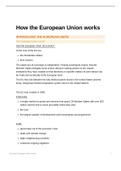Samenvatting
Summary Introducing the European Union
- Instelling
- Arteveldehogeschool (Artevelde)
Dit is een samenvatting van een PDF bestand: How the European Union Works. Het geeft uitleg over The European Union, the European Parliament and the European Council, maar ook wat deze precies doen, en wie tot deze instituties behoort.
[Meer zien]



